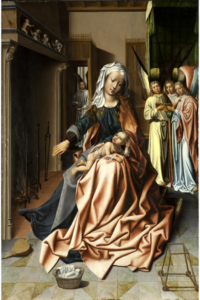Madonna of the Fireplace
Oil on panel, ca. 1500
Attributed to Jan Gossaert, called Mabuse
Flemish, b. Maubeuge?, ca. 1478, worked in Antwerp, d. Antwerp 1532
Though the Madonna of the Fireplace is a painting that continues to lack a firm attribution to a known painter; nonetheless, it is one of the “star” paintings in the collection. One of the primary considerations of Dr. Bob Jones Jr. in assembling the collection during the 1950s and 60s, was the importance of the painting’s quality, even if the work lacked sure authorship by a known artist.
The characteristics of this painting epitomize late fifteenth-century painting in the area of the Low Countries generically referred to as Flanders. The highly angled and stylized folds of the drapery are typical of paintings in the 1400s and even occur in carved sculpture from this period. The slightly awkward proportions and elongated facial features are stylistic hallmarks of the era as well as the very accomplished and detailed surface treatment. Even the setting for Mary and Christ strongly betrays its Northern origins. Though the fireplace carvings and treatment reveal the artist’s knowledge of Italian models, the tile floor patterns and the carved linen-fold wooden paneling would have been found in many well-to-do homes throughout Flanders. It is also the same kind of carved, period paneling on the very gallery wall on which this painting hangs in the museum.
One of the turning points in the history of Northern Renaissance art began when painters started depicting the Virgin in domestic interiors. Artists of the 1300s and early 1400s typically placed the Virgin within a church interior as part of an Annunciation scene or other narratives. However, this setting changed with innovations in the 1420s by Robert Campin, whose famous Merode Altarpiece (Metropolitan Museum of Art, New York) broke with tradition and pictured the Virgin in a domestic interior typical of a fifteenth-century home. M&G’s painter continues Campin’s vision later in the century with this remarkable panel—one of the most beautiful and well preserved paintings in the entire Museum & Gallery Collection.
Published in 2013
